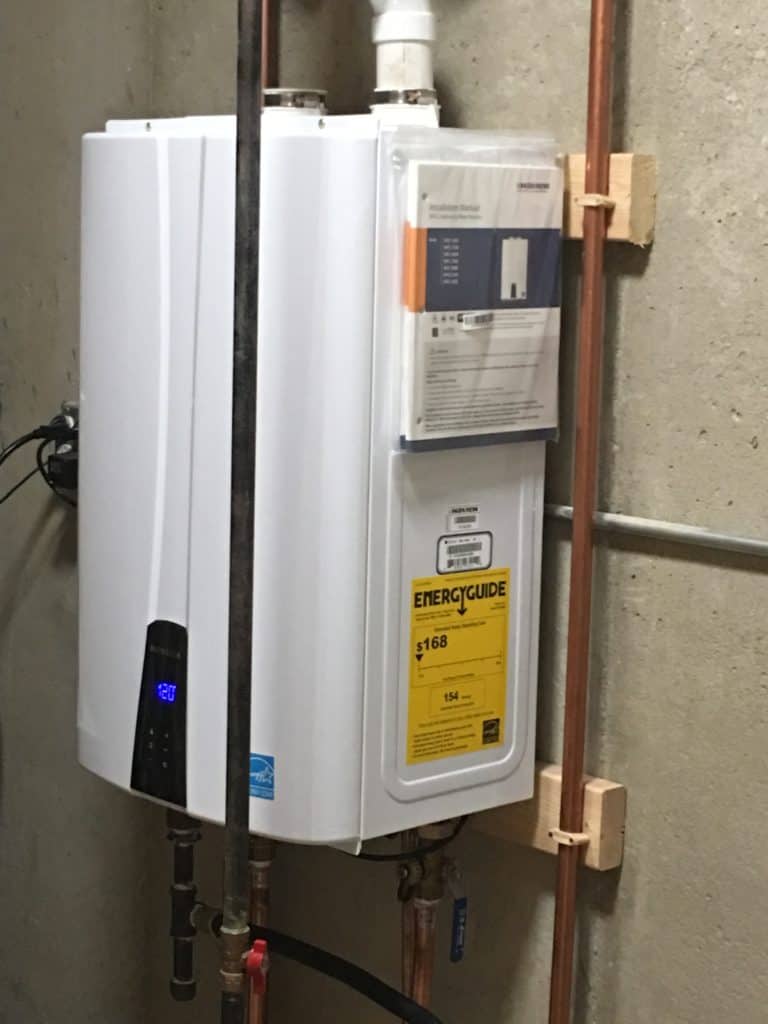Table of Contents
Historically, hot water heaters have usually had large tanks, used to store heated water for distribution as needed. More recently, homeowners have begun gravitating toward state-of-the-art tankless solutions, which provide hot water purely on-demand.
If your conventional water heater is on its last legs or you simply want to improve your hot water efficiency, it may be worthwhile to make the transition to a tankless unit. Doing so yields many benefits, which we’ll cover in-depth in this article.
Naturally, if you have any specific questions, we recommend consulting with a trusted local plumber. For a leading water heater installation company in Indianapolis, consider Carter’s My Plumber. We’re always happy to discuss some of the pros and cons of tankless water heaters, or to explain what the installation process looks like.

Why Invest in a Tankless Water Heater?
As you consider installing a tankless heater in your home, here are a few of the most significant advantages to keep in mind.
Energy Efficiency
One of the most common reasons to go tankless is to boost household energy efficiency. Tankless water heaters only heat water when it is needed, reducing energy consumption and lowering utility bills.
Smaller Footprint
Unlike traditional water heaters with large storage tanks, tankless models are compact and can be easily installed in tight spaces. Their space saving properties make them especially popular in condos and homes with smaller floorplans.
Continuous Hot Water
Tankless water heaters can provide an endless supply of hot water, eliminating the need to wait for a storage tank to refill. In other words, multiple people can use hot water at the same time, typically without any issue or interruption. Being able to run multiple showers at once is a boon to larger families!
Longer Lifespan
Tankless water heaters generally have a longer lifespan compared to traditional storage tank models, often lasting up to 20 years or more. What’s more, tankless water heaters allow for individual components to be repaired and replaced; unlike conventional heaters, tankless ones seldom need total replacement.
Reduced Risk of Water Damage
With no storage tank, there is a lower risk of leaks and water damage in case of a malfunction. This should provide homeowners with peace of mind about long-term maintenance issues.
Eco-Friendliness
For homeowners looking to “go green,” these heaters are the way to go. Tankless water heaters typically produce fewer greenhouse gas emissions due to their increased energy efficiency.
Improved Water Quality
Without a storage tank, there is less chance for sediment buildup or bacterial growth, leading to cleaner, fresher water. This may enhance health and wellbeing for everyone in the household.
Customization
Many tankless water heaters allow users to set their preferred water temperature, ensuring a comfortable experience during showers and baths.
Financial Incentives
Some regions offer incentives for homeowners who install energy-efficient appliances, such as tankless water heaters. These incentives can include tax credits and rebates.
Increased Home Value
Finally, going tankless can potentially increase the value of a home, making it an attractive selling point for potential buyers who desire water on demand.
Why Hire a Professional Plumbing Service for Your Water Heater Installation?
As you prepare to achieve major energy savings and say goodbye to cold water showers forever, it’s important to get professional assistance. Consider just a few of the reasons why homeowners need to enlist seasoned plumbers for their tankless heater installation.
- Selecting the right tank. There are multiple types of tankless heaters to choose from, including some that are powered by gas and others that are powered by electricity. A plumbing company can walk you through the pros and cons of each model and help you determine what’s best for your property.
- Addressing maintenance. A plumber will not only install your heater but also address any questions you may have about maintaining peak performance over the course of the unit’s life.
- Handling installation complexities. Installing a water heater may require your plumber to run a new gas line, or to answer important questions about how tankless water heaters work with well water. You’ll want a trusted professional to help you navigate any issues particular to your home or property.
Frequently Asked Questions About Tankless Heater Installation
What is the downside of a tankless water heater?
The most significant downside to tankless heaters is simply that they are more expensive on the front-end. (Though again, they will likely yield considerable savings over time!)
Is it worth switching to a tankless water heater?
For most homeowners, switching to a tankless unit is a great investment, offering energy savings, continuous hot water, easier maintenance, and a longer lifespan for the heater itself.
What is the most common issue with tankless water heaters?
Clogs and mineral buildups can occur, along with improperly adjusted pressure relief valves. All of these tankless water heater problems can easily be resolved by professional plumbers.
How many years does a tankless water heater last?
The typical tankless heater lasts for at least 20 years.
Are tankless water heaters a lot of maintenance?
Tankless heaters require very little maintenance, particularly relative to conventional heaters.



